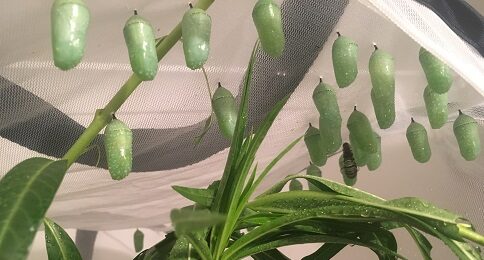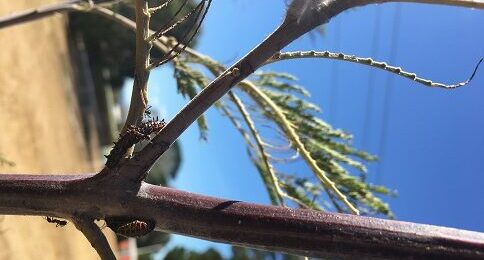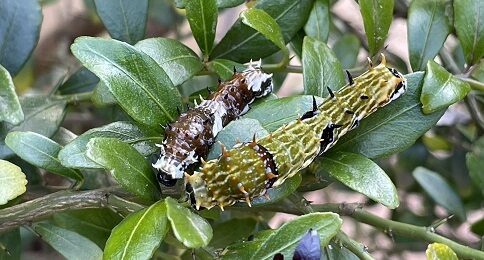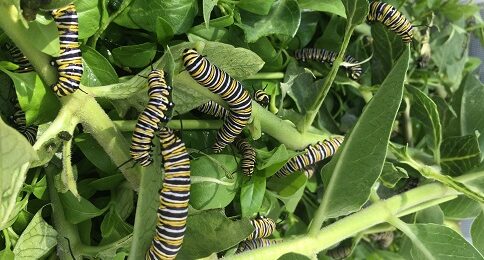Suyin was picking a lemon from her grandfather’s lemon tree when she noticed a brightly coloured caterpillar. She took it to her grandfather, who smiled when he saw it. He explained that he didn’t mind the caterpillars eating a few leaves from the tree as it meant that there would soon be butterflies visiting the flowers in the butterfly garden.

In this activity you and your young lepidopterists (butterfly scientists) will plant a butterfly garden! This butterfly garden will be a source of nectar for the adult butterflies as well as help to provide some host plants for the caterpillars.
For children to:
• understand the life cycle of butterflies
• investigate the specific needs of an animal
• participate in a hands-on activity
• monitor and assess the success of the butterfly garden over time
• communicate their findings.
This activity can be conducted at any time of the year so long as conditions in your area are suitable for planting.
If you live in a temperate zone, you may not be able to see any butterflies during winter as they are in diapause (a little like hibernation) or migrate away when it is colder. You will have the best success if you plan this for late winter to early spring.
Introduction
There are hundreds of different butterflies in Australia. Butterflies need nectar for their adult phase and host plants for their caterpillars. Most butterflies need specific types of host plants that only their type of caterpillar can eat. Before you begin, you will need to research the different butterflies in your area and find out what types of plants will be suitable, as well as prepare your site. Here are some suggested first steps:
- The conservation officer at your local council will be able to point you in the right direction about the types of butterfly in your area as well as what types of plants you can plant to attract butterflies and feed caterpillars.
- Use the Find a Group directory on the Landcare Australia website to get in touch with someone who may be able to help from your local group. They may also be able to help with resources and planting.
- The Australian Museum’s Butterfly and Moth Page
- Your local nursery.
Once you have selected and purchased your plants, you will need to select and prepare your garden bed. Butterflies need both sun and shelter away from the wind, so the best site for a garden bed for a butterfly garden is in a sunny, sheltered spot.
*This will be dependent on-site selection, travel time and having done prior research.
Checklist
Instructions
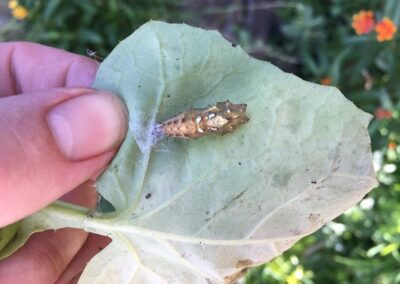
Step 1
Explain that today you will be planting a butterfly garden.
Discuss the role that butterflies play in nature. As nectar eaters, butterflies play an important role in pollination; as they visit flowers, they transport pollen from one flower to another.
Ask the students what butterflies they have seen and where they have seen them.
Display images of butterflies common in your area.
Use the activity sheet to illustrate the butterfly life cycle to help your learners identify the butterflies and caterpillars local to your area.
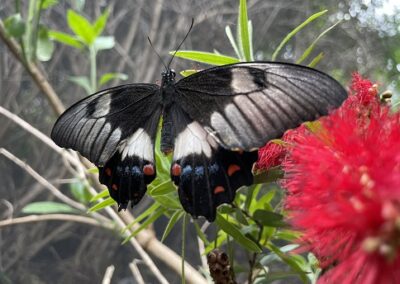
Step 2
Explain that there are two purposes for the plants that will be planted today.
The first purpose is nectar: these plants produce flowers that will feed the adult butterflies. The flowers we plant for butterflies often have clusters of small flowers – this allows the butterfly to get lots of small drinks at the one stop-over.
The second purpose is as a host plant. These may not have flowers suitable for butterflies but will instead be suitable for your local butterfly species to lay their eggs and raise their caterpillars. Discuss a butterfly local to your area and its caterpillars. Add a picture of the host plant to the activity sheet.
Use a T-chart to list the different plants and their purpose in the butterfly garden.
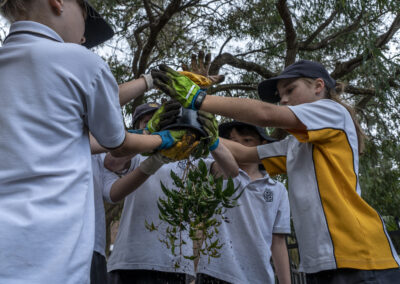
Step 3
Head outside to your prepared site.
Creating a butterfly garden can be a bit of an experiment.
Use the labels on the seedling punnets to decide on how to space your plants. Nectar plants are often planted in clumps as it helps butterflies to see them and is more inviting.
Use a trowel to dig a hole just big enough so the plant’s root section can be inserted. Tap the pot gently and squeeze the plant out without damaging the roots; place it in the hole and fill it with soil.
Create a saucer-shaped depression in the soil to act as a dam, and then water in the plants gently. Mulch around them to help reduce water loss and suppress weeds.
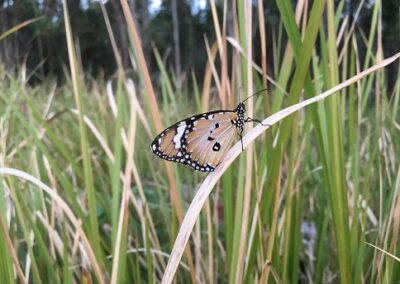
Step 4
Monitor and care for your butterfly garden.
As the plants mature, take note of the different butterflies that arrive. You may like to integrate this with our Getting the Buzz on Bees and other Beneficial Insects activity to help monitor both the butterflies but also other beneficial insects that will utilise your garden.
You may also add some other features for your butterflies, such as a damp soak (see the Water for Wildlife activity for more information).
Extension Activity
Study the life cycle of caterpillars and their transformation in more detail with a commercially produced caterpillar kit.
Create a poster of the butterflies you observe in the butterfly garden, identifying their scientific name and specific requirements such as their host plants.
Curriculum and Framework Links
SCIENCE
Year 5: ACSHE083
Year 7: ACSHE120
Year 8: ACSHE135
HUMANITIES AND SOCIAL SCIENCES
Year 2: ACHASSI042
Year 3: ACHASSI052, ACHASSI059, ACHASSI060
Year 4: ACHASSI080, ACHASSK088, ACHASSK090
Year 5: ACHASSI102, ACHASSK120
Year 6: ACHASSI122, ACHASSI130
DESIGN AND TECHNOLOGIES
Year 2: ACTDEK003
Year 3 & 4: ACTDEP017
Year 5 & 6: ACTDEP019
Year 7 & 8: ACTDEK032
HEALTH AND PHYSICAL EDUCATION
Year 2: ACPPS018, ACPPS022, ACPPS023
Year 3 & 4: ACPPS036, ACPPS040, ACPPS041
Year 5 & 6: ACPPS054, ACPPS059
Year 7 & 8: ACPPS073, ACPPS078
ETHICAL UNDERSTANDING
Exploring values, rights and responsibilities.
PERSONAL AND SOCIAL CAPABILITY
CURRICULUM CONNECTIONS
CROSS CURRICULUM PRIORITY
MY TIME, OUR PLACE: FRAMEWORK FOR SCHOOL AGE CARE
Reference List
ONLINE RESOURCES
Explore these Junior Landcare resources created to support educators and Landcare facilitators to enhance student resilience through creating butterfly gardens and tree planting. The resources include an educator guide, butterfly gardens project risk assessment guide, butterfly garden design activity sheet and planting a butterfly garden activity sheet.
PRINTABLE RESOURCES
Visit the Just for Kids section for easy-to-print activity sheets developed to help children at home and at school explore Junior Landcare and create their own ideas, including the ‘Pollinator – Who Am I?’ fun sheet.
WATCH
Explore the Pollinators playlist on the Junior Landcare YouTube channel, where Junior Landcare ambassador Costa Georgiadis leads children in their exploration of all things bees, bugs and beneficial gardening, through a series of fun educational videos.
READ
Designed and maintained by 200 children, read about Guardian Childcare and Education St. Clair’s Bringing Back the Butterflies program here – and how the South Australian centre’s native butterfly garden has become a thriving space where children learn more about plants, butterflies and what they need to survive.
IMAGE ATTRIBUTION
Images supplied by Sam Harrison.
Why not try one of our other Junior Landcare learning activities?
Love Letters to the Land
Biodiversity|First Nations Perspectives|Food Production|Waste Management
Creating a sensory garden
Biodiversity
Understanding weeds: life cycle
Biodiversity
Understanding weeds: investigation
Biodiversity
